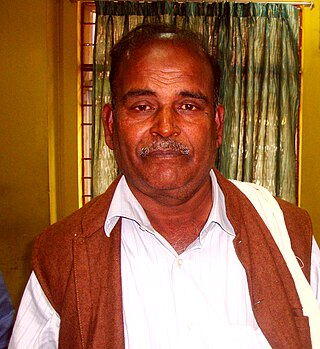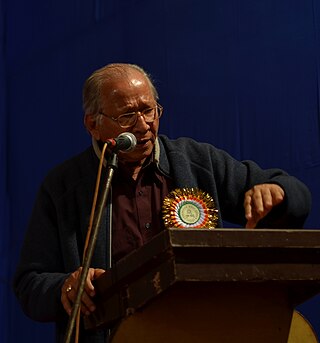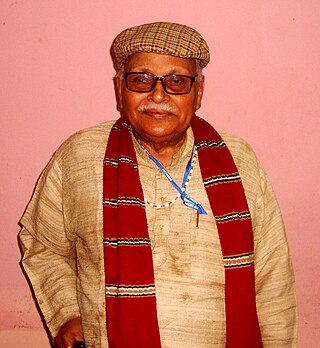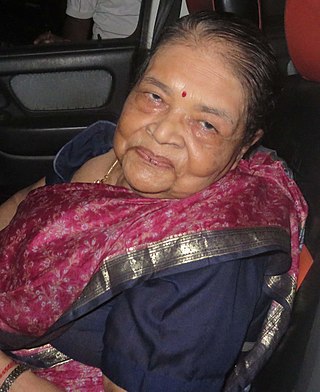
Jayanta Mahapatra was an Indian poet. He is the first Indian poet to win a Sahitya Akademi award for English poetry. He was the author of poems such as "Indian Summer" and "Hunger", which are regarded as classics in modern Indian English literature. He was awarded a Padma Shri, the fourth highest civilian honour in India in 2009, but he returned the award in 2015 to protest against rising intolerance in India.
The Karan or Karana is a community found in the state of Odisha in India. The post of Karana used to be a professional designation that was occupied by literate peoples. They held Karanam posts in some parts of Andhra Pradesh, where they speak Odia and played a similar role in Odisha to that of the Kayasthas of West Bengal and Bihar. In the social hierarchy of Odisha they rank next to Brahmins. They exclusively served the ruling powers as their ministers, advisors, governors, military commanders, record keepers and dewans. They owned most Zamindaris in Odisha. They have the highest literacy caste-wise and are highly prosperous. Today they are a politically dominant community and have reigned over the politics of Odisha for 50 years.

Ravenshaw University, formerly known as Ravenshaw College, is a co-educational state university situated in Cuttack, Odisha on the eastern coast of India. Founded as Ravenshaw College in 1868, the institution became a university in 2006. The university has nine schools, thirty three academic departments and a student enrolment of nearly 8,000. It is one of the oldest educational institutes in the country and its history is synonymous with the history of modern Odisha.

Jagadish Mohanty was a renowned Odia writer, considered as a trendsetter in modern Odia fiction, has received the prestigious Sarala Award in 2003, Odisha Sahitya Akademi Award in 1990 for his novel Kanishka Kanishka, Dharitri Award in 1985, Jhankar Award, Prajatantra Award. Born in Gorumahisani, an iron-ore mines in northern periphery in Mayurbhanj district of Odisha, he spent more than 30 years of his life working in the Mahanadi Coalfields Limited(MCL) in western periphery of Odisha. Though he kept himself away from the cultural capital of Odisha, but still his writings highlighted him in the mainstream of Odia literature and culture.
Odia literature is literature written in the Odia language, mostly from the Indian state of Odisha. The modern Odia language is mostly formed from Tadbhava words with significant Sanskrit (Tatsama) influences, along with loanwords from Desaja, English, Hindustani (Hindi/Urdu), Persian, and Arabic. Its earliest written texts date from around 1000 CE. The earliest Odia newspaper was Utkala Deepika, first published on August 4, 1866.

Gopabandhu Das (1877–1928), popularly known as Pandit Utkalamani Gopabandhu Das, was a social worker, reformer, political activist, journalist, poet and essayist.

MahapurusaAchyutananda Dasa was a 16th-century poet seer and Vaishnava saint from Odisha, India. He was considered to have the power to see the past, present and future. He was a prolific author, and one of the group of five, that led a revolution in spirituality in Odisha by translating Sanskrit texts into the Odia language for common people.

Gopinath Mohanty (1914–1991), winner of the Jnanpith award, and the first winner of the National Sahitya Akademi Award in 1955 – for his novel, Amrutara Santana – was a prolific Odia writer of the mid-twentieth century. Satya Prakash Mohanty, professor of English, Cornell University says: "In my opinion, Gopinath Mohanty is the most important Indian novelist in the second half of the twentieth century."

Sitakant Mahapatra is an Indian poet and literary critic in Odia as well as English. He served in the Indian Administrative Service (IAS) from 1961 until he retired in 1995, and has held ex officio posts such as the Chairman of National Book Trust, New Delhi since then.

The Odisha Pradesh Congress Committee is the unit of the Indian National Congress for the state of Odisha. It is responsible for organizing and coordinating the party's activities and campaigns within the state, as well as selecting candidates for local, state, and national elections in Odisha.

Jagannath Prasad Das is an Indian writer, poet, painter, playwright and novelist who writes in Odia.

Santanu Kumar Acharya is a Sahitya Akademi Award-winning Indian writer.
Bidhu Bhusan Das, also spelled Bidhubhusan Das, was a public intellectual, educator, professor, senior government official, and university president/Vice Chancellor from India.

Subrat Kumar Prusty is an Indian Odia-language scholar, activist, social entrepreneur, literary critic and author. He is Member Secretary of the Institute of Odia Studies and Research, Bhubaneswar, Odisha. He was instrumental in preparing the research documents, advocating the awarding of Classical Language status to Odia, forming Central Institute of Classical Odia, Odia University and implementation of the Odisha Official Language Act, 1954. He was awarded the Presidential Certificate of Honour and Maharshi Badrayan Vyas Samman – 2019 for Classical Odia.

Phurlijharan is a perennial waterfall in Bhawanipatna, Kalahandi district, Odisha, India. The falls on the Sagada river are 16 m high and known for the colored rainbows that the reflections of sunlight create here. It is a tourist attraction that is close to the Karlapat Wildlife Sanctuary.

Mohapatra Nilamani Sahoo, surname also spelt Sahu, was an Indian Odia language short story writer. He received several literary awards over his career, including the 1979 Odisha Sahitya Academy Award for Akasha Patala, and the 1983 Sarala Award and the 1984 Sahitya Akademi Award in Odia, for Abhisapta Gandharba. Sahoo died on 25 June 2016 after multiple organ failures.
Basanta Kumari Patnaik was an Odia language novelist, short story writer, playwright, poet and essayist; considered to be one of the pioneers in Odia literature. She became famous for her three novels: Amada Bata, Chorabali and Alibha Chita, among which Amada Bata has been adapted into an Odia film by same name.

Binapani Mohanty was an Indian Odia language writer and academician. She was well known for her works such as Patadei and Kasturi Mriga. She was a professor in economics before retiring. She had been awarded Padmashree by the Government of India and Atibadi Jagannatha Das Sammana by Odisha Sahitya Akademi. She had earlier won the Sahitya Akademi Award and Sarala Award. She had served as chairperson of Odisha Lekhika Sansad.
Karamat Ali Karamat (1936–2022) was an Indian Urdu poet, author, literary critic, and mathematician. Karamat is known for collecting and introducing Odisha's Urdu literature to the Urdu-speaking world. His works include Aab e Khizar (1963), Shu'aon Ki Salīb (1972), Izāfi Tanqīd (1977), Lafzon Kā Aasmān (1984), and Lafzon Kā Ākāsh (2000). Karamat received the 2004 Sahitya Akademi Translation Prize for his Urdu translation, Lafzon Kā Ākāsh.













